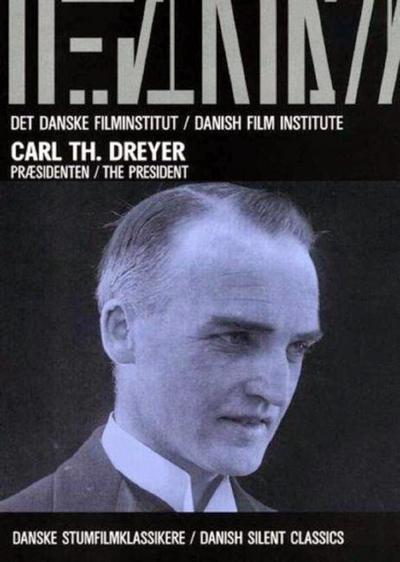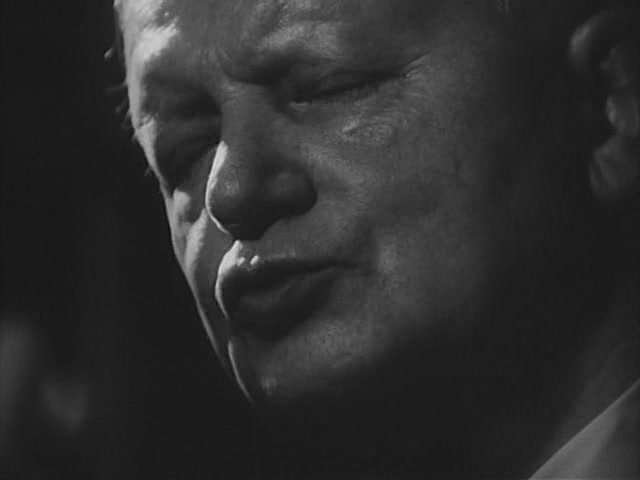Quote:
It perhaps comes as no surprise, given Carl Theodor Dreyer’s lifelong, idealized melancholy over his own unresolved parentage, that the scenario selected for his first film, The President would involve three generations of children conceived out of wedlock, and thematically crystallize on the legacy of their unreconciled paternity in the resolution of their own disparate lives. For Dreyer, this expurgation of such deep-seated trauma was not only manifested in the naïve idea of restoring the virtue and honor of a “fallen” woman (an archetypal surrogate for his own idealized, unwed, biological mother) through transcendence, but also in confronting the innate cruelty of the very institutions that socially (and inequitably) stigmatized such human transgressions through codified notions of morality and class division. It is within this framework that the film’s preface of the aging aristocrat, Franz Victor von Sendlinger (Elith Pio) offering a promissory relationship advice to his son Karl Victor (Halvard Hoff) on the folly of marrying outside (or more specifically, beneath) one’s social class while walking along the grounds of their forbiddingly isolated, dilapidated estate seems especially conducive to the figurative idea of empty, superficial, crumbling institutions and Dreyer’s own symbolic attempts to dismantle them.Read More »
Carl Theodor Dreyer
-
Carl Theodor Dreyer – Præsidenten AKA The President (1919)
1911-1920Carl Theodor DreyerDenmarkDrama -
Carl Theodor Dreyer – Der var engang AKA Once Upon a Time (1922)
1911-19201921-1930Carl Theodor DreyerDenmarkDramaFantasyQuote:
Once upon a Time (a.k.a. Der var engang) is an atypical film for the Danish filmmaker Carl Theodor Dreyer, a departure from his more usual realistic dramas into the realm of fantasy and fairytale. It was the only film that Dreyer made for the independent film producer Sophus Madsen, a Danish film enthusiast whose only other production was Laurids Skands’s all but forgotten Livets Karneval (1923). The film was adapted from a play by Holger Drachmann, written in 1885, that was itself based on Hans Christian Andersen’s fairytale Svinedrengen and Shakespeare’s The Taming of the
Shrew. From the outset, this was conceived as a lavish production, but it soon ran into financial difficulties. Even though some scenes were cut – including an extravagant market sequence – the film still ended up with a 150 per cent overspend on its 90,000
kroner budget.Read More » -
Carl Theodor Dreyer – La Passion de Jeanne d’Arc AKA The Passion of Joan of Arc (1928) (HD)
1921-1930Carl Theodor DreyerDramaFrancehe sufferings of a martyr, Jeanne D’Arc (1412-1431). Jeanne appears in court where Cauchon questions her and d’Estivet spits on her. She predicts her rescue, is taken to her cell, and judges forge evidence against her. In her cell, priests interrogate her and judges deny her the Mass. Threatened first in a torture chamber and then offered communion if she will recant, she refuses. At a cemetery, in front of a crowd, a priest and supporters urge her to recant; she does, and Cauchon announces her sentence. In her cell, she explains her change of mind and receives communion. In the courtyard at Rouen castle, she burns at the stake; the soldiers turn on the protesting crowd.Read More »
-
Carl Theodor Dreyer – Ordet AKA The Word [+extra] (1955)
1951-1960Carl Theodor DreyerClassicsDenmarkDramaPlot:
A farmer’s family is torn apart by faith, sanctity, and love—one child believes he’s Jesus Christ, a second proclaims himself agnostic, and the third falls in love with a fundamentalist’s daughter. Putting the lie to the term “organized religion,” Ordet (The Word) is a challenge to simple facts and dogmatic orthodoxy. Layering multiple stories of faith and rebellion, Dreyer’s adaptation of Kaj Munk’s play quietly builds towards a shattering, miraculous climax.Review:
‘Powerful’ doesn’t do justice to this 1955 exploration of life, death and faith from Danish master Carl Theodor Dreyer. Based on Kaj Munk’s 1932 play, ‘Ordet’ is an austere, realist work on one level as it joins a farming family in their Jutland home over a short but devastating period of time.Read More » -
Jørgen Roos – Carl Th. Dreyer (1966)
1961-1970Carl Theodor DreyerDenmarkDocumentaryJørgen RoosAt the world premiere of “Gertrud” in Paris, December 1964, Dreyer is greeted by many celebrities of the French cinema: Clouzot, Langlois, Truffaut, Godard, Anna Karina. Afterwards Dreyer delivers short comments on the style of each of his films. Already in his first film, from 1920, he strove for simplicity, especially in the set design. He started from the idea that each apartment gives an impression of the owner’s personality. By removing all superfluous details of the furnishing, the remaining, simplified scenery gives a heightened sense of authenticity. An authentic setting creates, according to Dreyer, a genuine style. To find this authenticity he often studies paintings from the period in which the story takes place. In his later films he brings this simplification process even further. He removes everything from the film that is not related to the story. He also simplifies the dialogue to find a more concise form, whereby he comes closer to the style of tragedy. (imdb)Read More »




